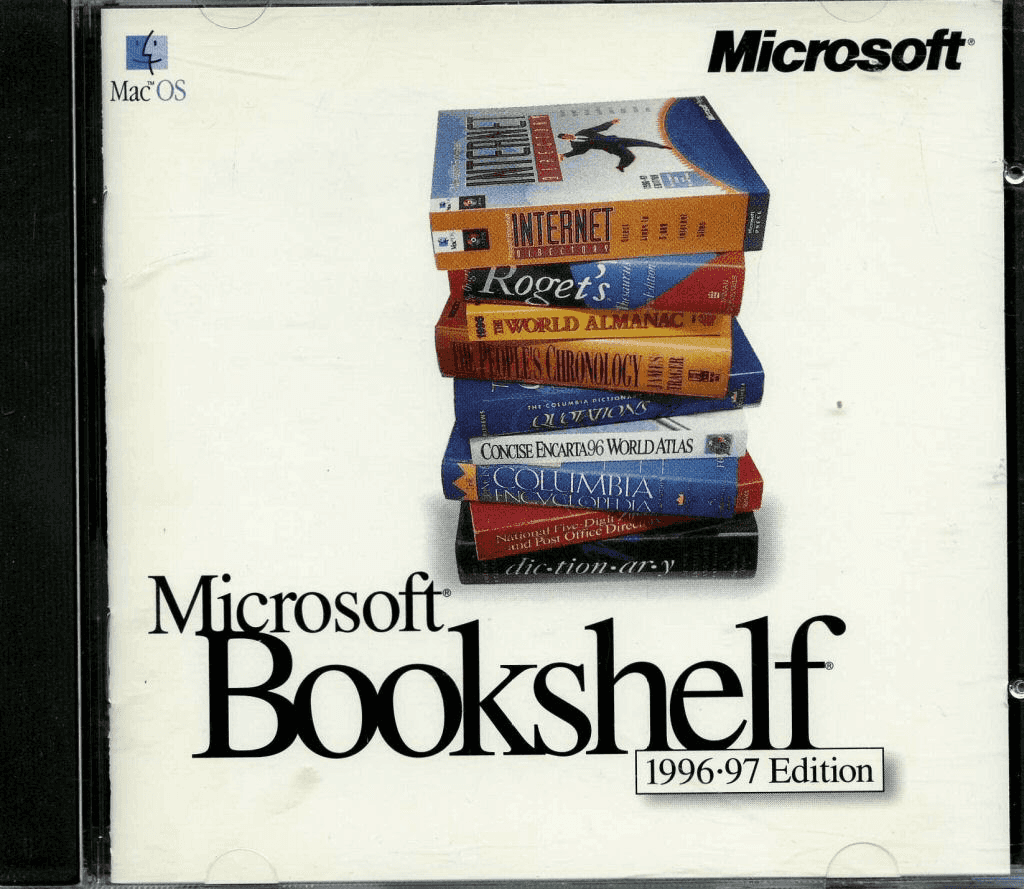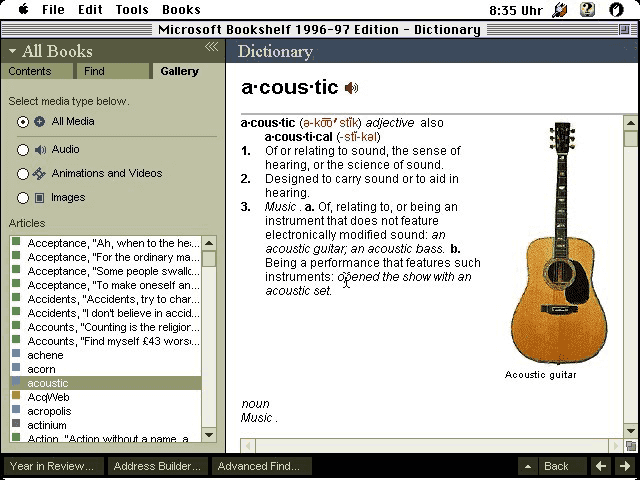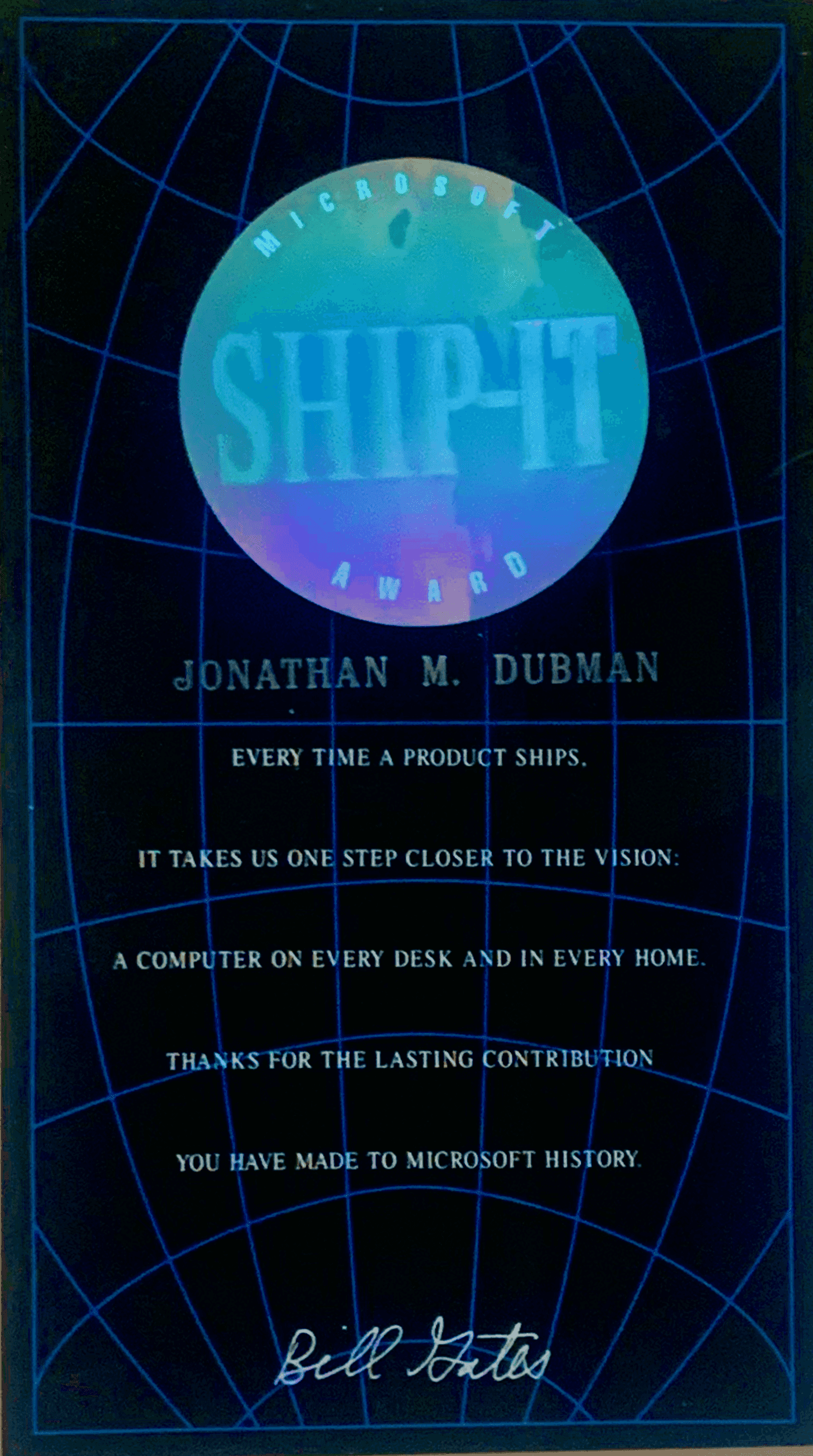How we almost invented Wikipedia, five years before Wikipedia

Microsoft Bookshelf was an encyclopedia, dictionary, thesaurus, atlas, world almanac, book of quotations, and even a zip code finder, browsable through a rich GUI client that predated multimedia on the web. As Works was for apps, Bookshelf was for content, a sort of compendium. As you started typing a search term, you’d instantly see ranked and categorized search results, updated with every keypress, and if you clicked on any of those, you’d get multimedia-enhanced interactive reference material that looked and worked a lot better than the primitive, early web.
Bookshelf was multi-platform, Mac and Windows. The Win32 C++ codebase used cross-compiler technology to target the Mac. A multimedia layer known as MediaView provided functionality somewhat analogous to a purpose-built Internet Explorer, with rich hypertext and locally-stored media assets. Voluminous content was mastered in SGML, not too far from HTML.
Contributing to this product meant a lot to me personally. The weighty tomes of the American Heritage Dictionary and the Brittannica Junior Encyclopedia had been fixtures of my youth. As a little kid, I tried reading them both cover to cover. Knowledge is power!
The moment just before the Internet Tidal Wave
I joined Bookshelf in 1994, which now feels like another era. (Even 2019 now seems like another era.) This was just before the release of Netscape Navigator, which some friends of mine left Microsoft in order to join.
Wikipedia was not launched until 2001. Google was not founded until 1998. 1994 was a pivotal moment, right on the cusp of the online revolution in the mid 90s, when AOL charged an hourly fee for a dialup service that had busy signals but lacked a real web browser.
But with CD-ROMs like Bookshelf and Encarta, you could look stuff up fast, hear things read aloud, view images, watch videos, follow links and find places on maps, without having to wait for slow dialup connections. These references had a search and browse experience that sort of resembled the modern web, at least in a confined and basically static information domain.
It was year and a half after I joined this team that Bill Gates penned the famed Internet Tidal Wave memo, which seemed to paint the vision of a horse as it was galloping out of the barn.

A screenshot of Microsoft Bookshelf for the Mac, for which I was the tech lead, showing an entry in the Dictionary with images and audio clips.
Building a more beautiful app
I wrote all kinds of indexes and word wheels and UI widgets to help users find and interact with content. Categorized, ranked hits would appear in real time as you were typing your search query, years before Google was founded.
Our designer (we actually had a designer, unlike most Microsoft products back then) came up with a fancy stylized UI that required reimplementing a lot of the OS system controls with only minor changes in functionality. This was educational for me, but really a huge waste of time. By 1996, the web was taking over the world. Multimedia CD-ROMs were on a clear path to extinction, like horse buggies a century earlier. Maintaining dominance of a vanishing market is an exercise in futility. A new UI aesthetic, a shiny new horse-drawn carriage, was not what we needed. The team and the product and its business model all had to fundamentally adapt, and everyone could sense it.
What the heck is X Bookshelf?
As I was coding and managing engineers helping to pump out profitable German, French, Japanese and British English versions of all these references (a lot more than translating menus and messages - the references themselves were totally different), some interesting projects were ramping up down the hall. One little group was trying to make a Craigslist around the same time as Craig, but they oddly gave up. I thought they were really onto something.
Another hush-hush group had the mysterious-sounding name of “X Bookshelf” (our actual, shipping product had no “X”.) They were supposedly working on something “online”. They weren’t really talking and I thought, this is really broken, I don’t know why I’m not involved in this, why aren’t we all involved in this? Why does our org have like 5% of its headcount working on something we all think is the future? It’s obviously not sustainable to ship truckloads of shrink-wrapped CD-ROMs with content that immediately goes stale, while blowing our limited content management budget producing a labor-intensive dribble of minor incremental online updates and corrections that users have to manually download and cache; this will never scale, and our market will quickly come to expect a more complete and current reference than we can ever provide without fully embracing the online future. If we don’t solve this problem, someone else soon will.
My vision for Bookshelf in 1996
Instead, I thought, let’s build a system that takes the content we already have as a starting point, but allows users of our app to submit edits to a common online source of truth, curated by us and a hierarchy of trusted delegates, with a steady, organic influx of new and updated content, informed by the expertise of a diverse user base whose collective breadth, depth and exposure to fresh news and information would massively exceed our own. Are these two guys doing that? Because if they are not, they’re wasting their time, and if we are not, we’re wasting ours.
Then, I thought, since we’re Microsoft and this is a real business, let’s also do these things in parallel:
Continue to sell ($) a rich client based on the Windows/Mac app we have, but with more and more dynamically updated data backing it over time, which schools and families with money will want to own, cross-promoted by #2.
Put up a simplified version on the web that’s free or has a generous free tier, which gets better over time as bandwidth and browser capabilities continue to improve.
Build a simple web browser extension for looking definitions up in context on any web page (like you can do in Safari today, and like Dictionary on NeXTStep before that). This gives us broad visibility, boosts the brand and plants a flag in that space - “Definition from Microsoft Bookshelf”.
How to make more money, I wasn’t quite sure, but I figured, if we don’t build #2, a good-enough reference on the web, someone else will, and we’re all going to be out of a job.
I did the best I could to promote this vision, but even with an existential threat, the leadership in this Microsoft division seemed oddly lacking in self-efficacy, like a deer in the headlights, as the web loomed larger every day.
Making the ferry, but missing the boat
When the larger business unit scheduled an all-day Bainbridge Island offsite meeting on our future strategy, my Acura Integra stalled in the boarding line for the car ferry in downtown Seattle, and wouldn’t restart, and the ferry was seconds from leaving the dock. I couldn’t push the car up a ramp. With no time to fix anything, I had to think fast. Carrying all those ideas in my head, I was so determined to participate in that meeting I just abandoned my car in line and leapt over the threshold, yelling Go ahead and tow it! over strenuous official objections as the foghorn blared.
Once on board, I hitched with coworkers and made it to the offsite, but since our business unit was the one making real money in the division, leadership was pretty allergic to giving stuff away for free (which recovering my car was not!) FreeCell solitaire was grandfathered in. And Web 2.0 was a tough sell to a division still internally resistant to Web 1.0.
I never got a firm handle on exactly what the “X Bookshelf” team actually did, but it fizzled.
Moving up, and moving on
My excellent immediate dev manager (also under 30) surprised me with an early retirement when the stock was on fire, and I became his default replacement in an acting capacity. I was fully in my comfort zone as a first-level manager, and I hit my engineering productivity stride, as I was now an expert on our entire tech stack and code base. Everything went extremely well for months, until it was time to hire his formal replacement, whose job as far as I could tell would be the one I was already doing.
For reasons I could never fathom, despite my flawless track record on this team for years and the expansive product vision I was carrying around, a higher-up who didn’t know me so well (the developer of FreeCell for Windows!) elected not to offer me the role despite my active stated interest. They would hire someone new (and, by definition, inexperienced in our unique and complex codebase) to manage me plus some contractors and the one other full time developer remaining on the team, whom I had mentored. It was likely that a lot of my job would then be teaching this person how to do theirs. By this point I felt like maybe I should be teaching the higher-up how to do his.
This made no sense to me. What future were they envisioning that they thought I couldn’t handle? As far as I could tell there was no real vision beyond the one in my own head. This was a small, high functioning team I was already effectively leading. We were the ones shipping the products that were paying for all the other escapades in that division. On the default track, I thought Bookshelf and Encarta would see plummeting sales within a couple of years anyway as the action moved online, so what was the big risk? The risk they should have been considering was the opportunity cost to Microsoft, in both the short and long term, when I walk out the door.
At this point I didn’t need the income. What I needed was a break. I wanted to travel, reconnect with my family, explore and pursue other interests, while tending my garden in Seattle, metaphorically and literally. Some friends who had left were having way more fun than I was. I felt somewhat dissed and under-appreciated by the company after a lot of hard work and personal sacrifices, and I figured that it would be healthy to gain some broader life experiences even if it meant taking a financial hit.
And thus I decided to gracefully exit, joining the growing ranks of the Microsoft retirees in 1997, just before my 29th birthday.
